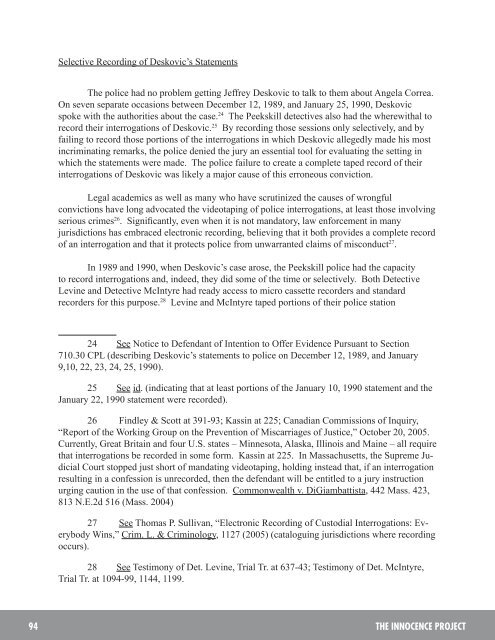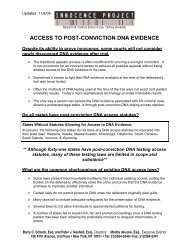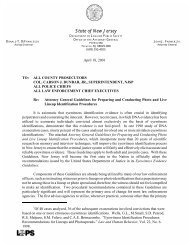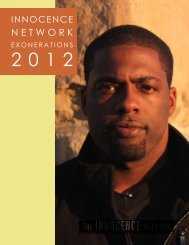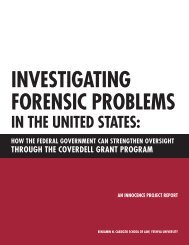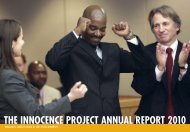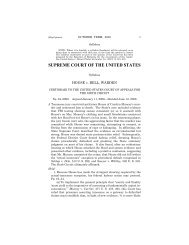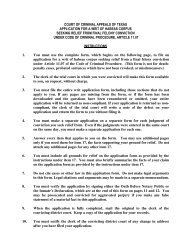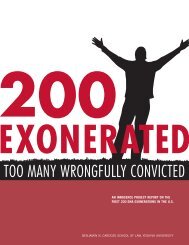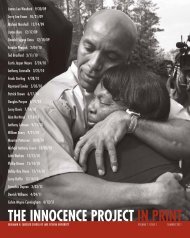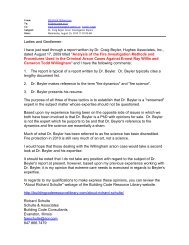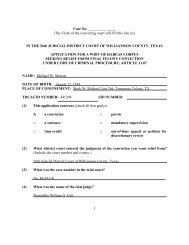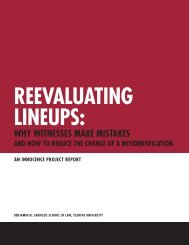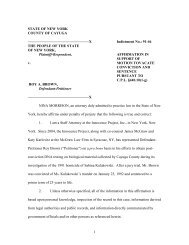Lessons Not Learned - The Innocence Project
Lessons Not Learned - The Innocence Project
Lessons Not Learned - The Innocence Project
Create successful ePaper yourself
Turn your PDF publications into a flip-book with our unique Google optimized e-Paper software.
Selective Recording of Deskovic’s Statements<br />
<strong>The</strong> police had no problem getting Jeffrey Deskovic to talk to them about Angela Correa.<br />
On seven separate occasions between December 12, 1989, and January 25, 1990, Deskovic<br />
spoke with the authorities about the case. 24 <strong>The</strong> Peekskill detectives also had the wherewithal to<br />
record their interrogations of Deskovic. 25 By recording those sessions only selectively, and by<br />
failing to record those portions of the interrogations in which Deskovic allegedly made his most<br />
incriminating remarks, the police denied the jury an essential tool for evaluating the setting in<br />
which the statements were made. <strong>The</strong> police failure to create a complete taped record of their<br />
interrogations of Deskovic was likely a major cause of this erroneous conviction.<br />
Legal academics as well as many who have scrutinized the causes of wrongful<br />
convictions have long advocated the videotaping of police interrogations, at least those involving<br />
serious crimes 26 . Significantly, even when it is not mandatory, law enforcement in many<br />
jurisdictions has embraced electronic recording, believing that it both provides a complete record<br />
of an interrogation and that it protects police from unwarranted claims of misconduct 27 .<br />
In 1989 and 1990, when Deskovic’s case arose, the Peekskill police had the capacity<br />
to record interrogations and, indeed, they did some of the time or selectively. Both Detective<br />
Levine and Detective McIntyre had ready access to micro cassette recorders and standard<br />
recorders for this purpose. 28 Levine and McIntyre taped portions of their police station<br />
24 See <strong>Not</strong>ice to Defendant of Intention to Offer Evidence Pursuant to Section<br />
710.30 CPL (describing Deskovic’s statements to police on December 12, 1989, and January<br />
9,10, 22, 23, 24, 25, 1990).<br />
25 See id. (indicating that at least portions of the January 10, 1990 statement and the<br />
January 22, 1990 statement were recorded).<br />
26 Findley & Scott at 391-93; Kassin at 225; Canadian Commissions of Inquiry,<br />
“Report of the Working Group on the Prevention of Miscarriages of Justice,” October 20, 2005.<br />
Currently, Great Britain and four U.S. states – Minnesota, Alaska, Illinois and Maine – all require<br />
that interrogations be recorded in some form. Kassin at 225. In Massachusetts, the Supreme Judicial<br />
Court stopped just short of mandating videotaping, holding instead that, if an interrogation<br />
resulting in a confession is unrecorded, then the defendant will be entitled to a jury instruction<br />
urging caution in the use of that confession. Commonwealth v. DiGiambattista, 442 Mass. 423,<br />
813 N.E.2d 516 (Mass. 2004)<br />
27 See Thomas P. Sullivan, “Electronic Recording of Custodial Interrogations: Everybody<br />
Wins,” Crim. L. & Criminology, 1127 (2005) (cataloguing jurisdictions where recording<br />
occurs).<br />
28 See Testimony of Det. Levine, Trial Tr. at 637-43; Testimony of Det. McIntyre,<br />
Trial Tr. at 1094-99, 1144, 1199.<br />
94 THe InnoCenCe PRoJeCT


